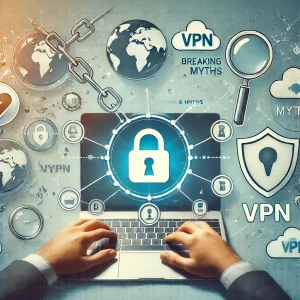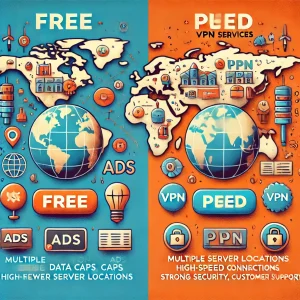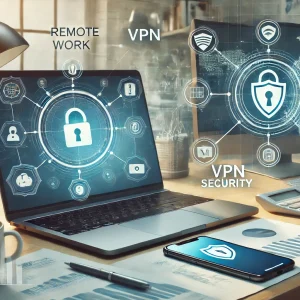In an increasingly digital world, the importance of cybersecurity cannot be overstated. With the rise of sophisticated cyber threats, protecting sensitive data has become paramount for both individuals and organizations. The Role of VPNs in Protecting Against Cyber Threats is becoming more critical as virtual private networks (VPNs) have emerged as a crucial tool against these threats. VPNs provide a robust layer of security to safeguard online activities. This blog explores the role of VPNs in protecting against cyber threats, delving into their functionalities, benefits, and the reasons behind their growing adoption.
Understanding VPNs
The Role of VPNs in Protecting Against Cyber Threats begins with understanding what VPNs are. A Virtual Private Network (VPN) is a technology that creates a secure and encrypted connection over a less secure network, typically the internet. This secure connection ensures that data transmitted between a user’s device and the VPN server remains private and protected from unauthorized access. VPNs operate by routing a user’s internet traffic through a remote server, effectively masking the user’s IP address and encrypting all data sent or received.
Key Functions of VPNs
- Encryption: The Role of VPNs in Protecting Against Cyber Threats includes the use of advanced encryption protocols. These scramble data, making it unreadable to anyone who might intercept it. This encryption is crucial in protecting sensitive information such as login credentials, financial transactions, and personal communications from cybercriminals.
- IP Masking: By routing internet traffic through a remote server, VPNs mask the user’s real IP address with the server’s IP address. This process hides the user’s location and identity, providing anonymity and reducing the risk of targeted cyber attacks.
- Secure Access to Public Wi-Fi: Public Wi-Fi networks are notorious for their lack of security. This makes them prime targets for hackers. The Role of VPNs in Protecting Against Cyber Threats is evident as VPNs provide a secure tunnel for data transmission. This allows users to safely access public Wi-Fi without the risk of data breaches.
- Bypassing Geo-Restrictions: VPNs enable users to bypass geographical restrictions and access content that may be blocked in their region. While this feature is often associated with streaming services, it also plays a critical role in ensuring access to vital information in regions with internet censorship.Empower your trades — smart, safe, and streamlined with Helder Bitnova https://helder-bitnova.net/.
The Growing Cyber Threat Landscape
Understanding The Role of VPNs in Protecting Against Cyber Threats requires an awareness of the evolving cyber threat landscape. Cyber threats are evolving at an alarming rate, with cybercriminals employing increasingly sophisticated methods to exploit vulnerabilities. Some of the most prevalent cyber threats include:
- Phishing Attacks: Cybercriminals use deceptive emails or websites to trick individuals into revealing sensitive information such as passwords or credit card details.
- Malware: Malicious software, including viruses, ransomware, and spyware, can infiltrate systems, steal data, and cause significant damage.
- Man-in-the-Middle Attacks: In these attacks, cybercriminals intercept communications between two parties to steal data or inject malicious code.
- Data Breaches: Unauthorized access to sensitive data can result in significant financial and reputational damage for individuals and organizations.
How VPNs Mitigate Cyber Threats
The Role of VPNs in Protecting Against Cyber Threats includes several mechanisms to protect against the diverse range of cyber threats:
- Enhanced Data Privacy: VPNs ensure that data transmitted over the internet remains private by encrypting it. This encryption prevents cybercriminals from intercepting and deciphering sensitive information.
- Protection Against Surveillance: Governments and ISPs often monitor online activities, raising concerns about privacy. VPNs shield users from such surveillance, ensuring their online activities remain confidential.
- Prevention of Data Breaches: By masking the user’s IP address and encrypting data, VPNs make it significantly more challenging for cybercriminals to target and breach a user’s system.
- Safe Remote Work: With the rise of remote work, employees often access company resources from various locations, increasing the risk of cyber attacks. VPNs provide a secure connection to corporate networks, protecting sensitive business data from unauthorized access.
Choosing the Right VPN
To maximize The Role of VPNs in Protecting Against Cyber Threats, selecting the right VPN is crucial. Key factors to consider when choosing a VPN include:
- Security Protocols: Look for VPNs that offer robust encryption protocols such as OpenVPN, IKEv2/IPSec, and WireGuard. These protocols ensure data remains secure and private.
- No-Logs Policy: A VPN with a strict no-logs policy ensures that the provider does not store any data about the user’s online activities, enhancing privacy.
- Server Locations: A wide range of server locations allows users to choose from various IP addresses, enhancing anonymity and enabling access to geo-restricted content.
- Speed and Performance: VPNs can sometimes slow down internet connections. Opt for a VPN that offers high-speed servers and minimal impact on performance.
- Customer Support: Reliable customer support is essential for addressing any issues or concerns that may arise while using the VPN.
Conclusion
In an era where cyber threats are becoming increasingly sophisticated, The Role of VPNs in Protecting Against Cyber Threats is more critical than ever. By providing encryption, anonymity, and secure access to the internet, VPNs offer a robust defense against a wide range of cyber threats. Whether for individual users seeking to protect their personal data or organizations aiming to secure their networks, VPNs are an indispensable tool in the ongoing battle against cybercrime.
By understanding The Role of VPNs in Protecting Against Cyber Threats, users can make informed decisions to enhance their online security. As the cyber threat landscape continues to evolve, the adoption of VPNs is likely to grow, further cementing their role as a cornerstone of modern cybersecurity strategies.
If you know about the Top VPN Services in 2024, click here





